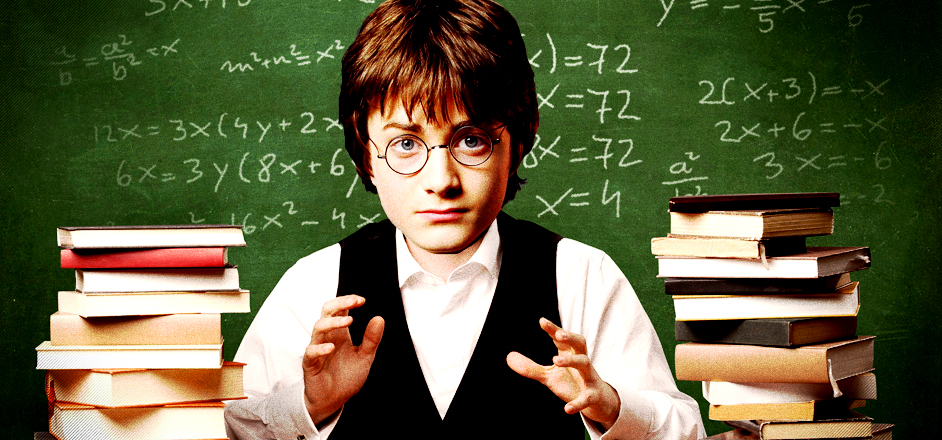The Harry Potter series has become one of the most influential book collections of the modern era.
When Facebook asked 130,000 adult users to share a book that touched, changed, or otherwise affected them, Harry Potter was named in a tremendous 21 percent of all responses, beating out “To Kill a Mockingbird,” “Lord of the Rings,” and even The Bible.
Given the massively popular and pervasive narrative the story has become, it’s no surprise the books have inspired movies, theme parks, stuffed animals, soaps, swimsuits, kitchen utensils, jewelry, and even vibrating broomsticks. What is surprising, however, is that an elaborate fantasy series about magic and sorcery would become the subject of numerous scientific studies, books and college courses.
Remarkably, it seems the wizarding world has a lot to teach us about the real world.
—–
Psychology
According to research published in the Journal of Applied Social Psychology, reading Harry Potter may make young people more empathetic and unprejudiced.
The study found that children who read passages about Harry’s relationships with stigmatized members of the magical world — like Mudbloods (wizards with non-magical parents), half-giants (born from historically “brutish” beasts), and house elves (servants and slaves of the wizards) — later displayed enhanced tolerance toward real-life stigmatized groups, such as immigrants, gays and refugees, compared to children who read more neutral excerpts.
“The world of Harry Potter is characterized by strict social hierarchies and resulting prejudices, with obvious parallels with our society,” the researchers write.
“Harry has meaningful contact with characters belonging to stigmatized groups. He tries to understand them and appreciate their difficulties,” they further explain. The researchers’ discovery indicates that engaging with these social and cultural complexities in literature can improve empathy early in life, and encourage a more progressive perspective, even into adulthood.
Politics
The findings of the previous psychological study also support analysis amassed into the book “Harry Potter and the Millennials: Research Methods and the Politics of the Muggle Generation,” which explores the moral lessons instilled in university students who are fans of the fantasy series.
The book verifies that children who’d read Harry Potter tended to be more open to political tolerance, diversity and acceptance. Potter fans were also found to be less cynical, more politically active, more liberal, less authoritarian, and less likely to support the use of violence and torture.
To take these results one step further, a study entitled “Harry Potter and the Deathly Donald” in the journal PS: Political Science & Politics concluded that Harry Potter readers are more inclined to dislike President Donald Trump.
Author of the analysis, University of Pennsylvania professor Diana Mutz, argues that readers might see parallels between Trump's political style and the book's villain, Lord Voldemort. Author J.K. Rowling was relatively vocal about drawing the same conclusion:
How horrible. Voldemort was nowhere near as bad. https://t.co/hFO0XmOpPH
— J.K. Rowling (@jk_rowling) December 8, 2015
Personality
Additional research demonstrates that Harry Potter not only provides an indication of political leanings, but also of major personality traits. Most readers feel a particular connection to one of four Hogwarts houses, be it the brave Gryffindors, the wise Ravenclaws, the nice Hufflepuffs or the ambitious Slytherins.
To validate their fateful place in the house they most associate with, fans can bare their soul for a personality test on Pottermore, the Harry Potter-themed web site conceived by J.K. Rowling herself, which then assigns the proper house as efficiently as an authentic Sorting Hat.
For those who strongly identify with the characteristic makeup of their sorting, it should come as no surprise that contemporary research in the journal Personality and Individual Differences indicates that a person’s perceived Hogwarts house can accurately reflect significant aspects of their personality.
In the study, a sample of 132 fans who’d already received their Pottermore-identified house assignments completed a series of personality assessments, and house scores were compared to scores for the entire sample. The results verified that people’s personalities tended to embody the defining characteristics of their respective house.
Ravenclaws, known for cleverness and learning, scored highest in “need for cognition”; Slytherins, known for ambition and manipulation, scored highest for “Dark Triad” traits, comprised of narcissism, psychopathy and Machiavellianism. Hufflepuffs, known for their kind nature, were assessed as “most agreeable.” Only Gryffindors, known for bravery and extraversion, didn’t consistently match up with their Harry Potter counterparts.
These findings authenticate the relevant theory that the connections we feel to fictional groups and characters have a very real-world influence.
—–
The Potter saga is much more than a series of children’s stories. As illustrated by the myriad studies to emerge from the novels, the wizardly world shapes us in ways that stretch far beyond the page, impacting our psychology, politics and personality.
In any case, for an elaborate fantasy to illustrate, influence and transform the world around us is nothing short of magical.



Leave a Reply